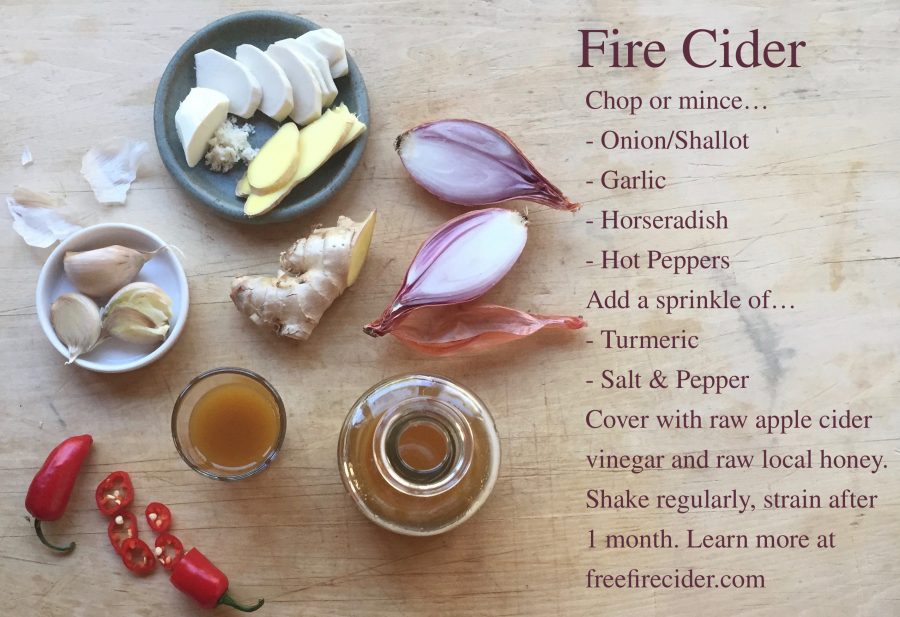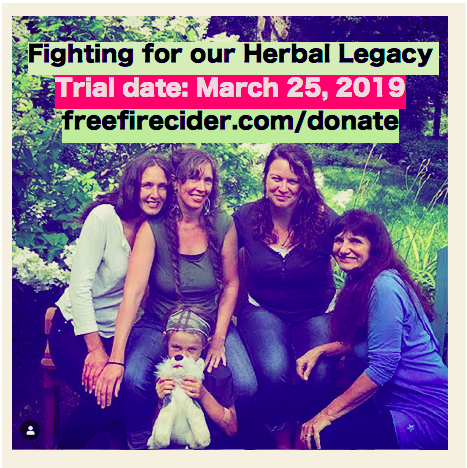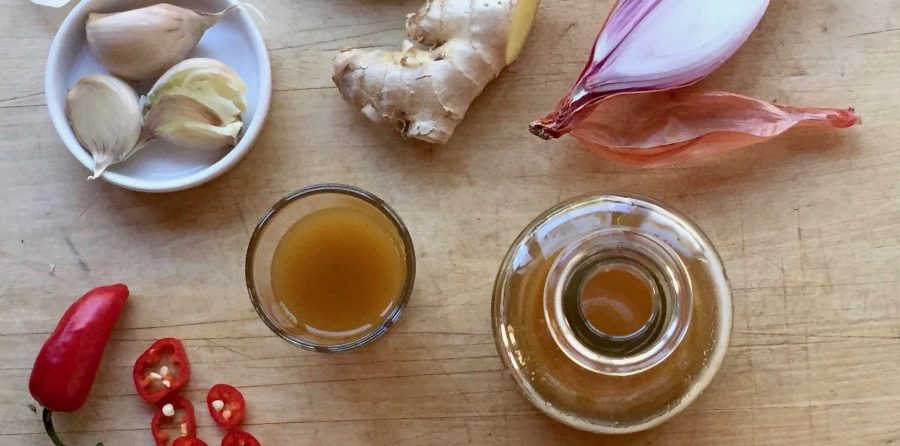Fire cider. It's a loaded term. To newbies, it's simply a sweet, pungent, spicy remedy. We take it by the spoonful to warm our bones, ward off infections, and keep the cardiovascular system healthy. But, to those of us deeply entrenched in the herbal community, it's become much more. It's a trademark. It's a lawsuit. It's an infringement of access to our traditional remedies. It's a controversy. This Monday marks the beginning of the Fire Cider Trials in the United States judicial system, which seems like the perfect time to get you up to speed (if you aren't already) and send some support to the Fire Cider Three.
Let me back up a bit...

What's Fire Cider?
Fire cider is a blend of spicy, pungent veggies (onions, garlic, hot peppers, horseradish, ginger, etc.) preserved in apple cider vinegar, often with some honey as well. See my version of the recipe above. Surely many people throughout history have made fire cider-like remedies. The term "fire cider" was coined by one of our most famous herbalists, Rosemary Gladstar in 1980, where it's featured in her home study course, copy written books, and writings. Rosemary is a generous soul devoted to spreading the joy of plant medicine and home remedies. She encourages her students and readers to make, take, share, re-invent, and sell their herbal creations freely. I don't sell products personally, but I've been teaching my students how to make fire cider since my very first classes in 2005. It's a common preparation for first-year herb students to make in herb school.
Enter a Trademark
Around 2010, husband and wife team Amy Huebner and Dana St. Pierre began making Fire Cider informally, based on a recipe Dana learned from his grandmother. A few years later, they decided to go public to create a full-fledged business (Shire City Herbals) and sell it widely. I first heard about their product a year before the controversy began. One of my former students (who knew all about fire cider from our classes) managed the supplement aisles of my local co-op and was so excited to be able to bring it into her store's offerings. She gave me a taste, and I agreed it was a really yummy, great product with super cute packaging.
What we didn't realize was that Shire City Herbals had actually trademarked the name "fire cider" at the advice of a business consultant who feared another company would swoop in to trademark it first, preventing them from selling the product. Reportedly, neither Shire City Herbals nor the U.S. trademark office had any idea that products with this name were already widely available, written about, taught about, and sold across the country.

Controversy Ensues
Really, Shire City Herbals and U.S. Trademark office should've known better. A quick Google search would've brought up plenty of hits on "fire cider" recipes and products sold all over the country. One of the requirements for a trademark to be granted is that the name is unique, which "fire cider" most certainly is not. Some people liken it to trademarking "IPA" beer.
Shire City Herbals (SHC) sold their product for at least a year without anyone in the herbal community realizing that the name "fire cider" had been trademarked. Then, in 2014, SCH began targeting other companies who made and sold fire cider. The herbal community became aware when several small-scale fire cider makers got letters from Etsy (via SCH's complaints) that they were selling products that violated trademark laws. In order to protect their trademark, SCH had to inform other companies (some of which were making and selling fire cider before they were!) that they were now in violation of the law and needed to change their product name or face legal action.
Word spread like wildfire. The herbal community was shocked and enraged. Many us contacted SCH directly to express our dismay and concern with the situation. Rosemary Gladstar spoke with them. I conversed via email with Amy. Many others did as well. Their Facebook page blew up. In February, 2014, after consulting with their business advisors, SCH wrote an open letter to the herbal community saying that they would not revoke their trademark or work with the herbal community to protect it as a product name available and open to all. They stated in that open letter that if the herbal community if they wanted to pursue it further and revoke the trademark, they should file a petition with the U.S. Trademark office to cancel it. And so we did.
Note that SCH's trademark only pertains to people and companies selling fire cider as a product. I can still teach people how to make fire cider and write about it on my blog. Rosemary can still write about it in her books. But, if you want to sell "fire cider," you need to come up with a new name.
More than 12,000 signatures had been collected on a change.org petition, and a boycott of the product ensued. By summer 2014, the petition to cancel the trademark was filed, led by three herbalists now known as the "Fire Cider 3" - Nicole Telkes, Mary Blue, and Kathi Langelier, three herbalists who had been making fire cider who were willing to become the face of the movement and trademark cancellation petition (which is, in essence, a lawsuit).
It's been a long, slow, messy, and painful process. SCH' presented the community like a pack of rabid animals attacking their small family business, making it difficult for their small business to thrive. (Actually, many of us -- including myself and Rosemary -- communicated with them in calm, rational, respectful manners, though I have no doubt that some in the herbal community did respond in rage.) SCH sued Nicole, Mary, and Kathi for $100,000 each in damages for the boycott and trademark infringement. This stalled the trademark cancellation trials. In 2016, a federal judge threw out the counts in the lawsuit related to damages from the boycott (fire cider products by SCH and similar products by other companies have increased in sales since the controversy began), though the trademark infringement charges till stand.

Trials Begin Today
Today, March 25, 2019, five years after the controversy first began, the trial to cancel SCH's petition finally begins. Although a group of lawyers and Maine have stepped up to help support this case, the legal costs remain nonetheless quite high. They estimated $40,000 to cover court costs and are getting close to raising that amount (woot!) -- please consider donating here. Herbalists are not generally independently wealthy; you could probably make the same net income flipping burgers at McDonalds (seriously). We do it because it matters. Because we are called to do it. For the herbal community, this is less about selling products and more about protecting the names of traditional remedies that have always belonged to the general public.
As I told Amy myself when I communicated with her back in 2014, I have no problem with them trademarking their product's name, but if they wanted to trademark it, they should've given it a legitimately unique name. The U.S. Trademark Office should have never let them trademark it. All anyone would need to have done is a quick Google search to determine it did not fulfill the requirements of a name that could be trademarked.
If you'd like to get the latest legal news or donate to support the cause (Kathi, Mary, and Nicole could really use the support!) visit freefirecider.com.
Also check out this really nice article on the controversy by the New York Times.
My support to the Fire Cider 3 and the lawyers representing them this week -- good luck!

